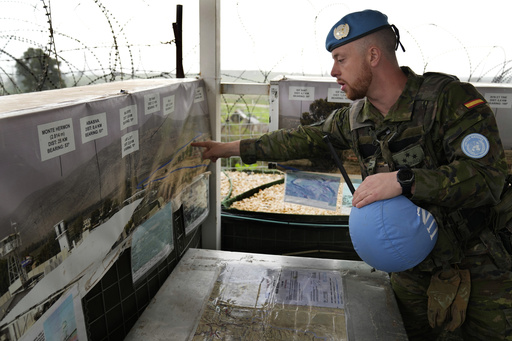
GENEVA — On Friday, a spokesperson for the United Nations peacekeeping mission in southern Lebanon confirmed that the forces are continuing to hold their ground despite warnings from the Israeli Defense Forces (IDF) for them to retreat. According to Andrea Tenenti of UNIFIL, the interim force deployed in Lebanon, a consensus was reached among its 50 contributing nations and the Security Council to maintain their positions in order to effectively monitor the ongoing conflict and facilitate humanitarian aid distribution to civilians in need.
Tenenti expressed concerns about the safety of their personnel, noting that the IDF has frequently targeted their positions, and Hezbollah has launched rockets towards Israel from locations near the UN peacekeepers. This situation escalates the danger faced by those involved in the peacekeeping mission. During a video briefing from Geneva, Tenenti stated, “The IDF has repeatedly targeted our positions, putting our troops at risk.”
Earlier this month, UNIFIL reported that an Israeli tank directly fired at its headquarters in Naqoura, damaging an observation tower and injuring two Indonesian peacekeepers. Additionally, Germany announced that one of its navy ships, part of the UNIFIL mission off the coast of Lebanon, successfully intercepted a drone of unknown origin.
Tenenti indicated that the recent rise in tensions between Hezbollah and Israeli forces has led to a substantial increase in security concerns, resulting in UNIFIL suspending most of its patrols near the contentious “Blue Line” border which divides Lebanon and Israel. He revealed that they are currently observing hundreds of trajectories crossing the Blue Line daily, which forces peacekeepers to seek shelter for extended periods, ensuring their safety remains their utmost priority.
Despite the pressures from the IDF to evacuate positions close to the Blue Line, Tenenti affirmed that UNIFIL will not retreat. He noted that the peacekeeping forces maintain 29 positions located within five kilometers (approximately three miles) of the boundary. He remarked that he was not aware of any instances where UNIFIL troops had discharged their weapons in self-defense.
While he acknowledged the possibility of using self-defense, Tenenti emphasized the need for a cautious approach, stating, “It’s crucial that we don’t become entangled in the conflict.” He added that the decision on when to employ self-defense strategies rests with the commanders stationed on the ground.
The ongoing hostilities have prompted the U.N. migration agency to report that nearly 800,000 individuals have become internally displaced within Lebanon, with approximately three out of five affected people forced to move from areas under UNIFIL’s jurisdiction.
Israel has critiqued UNIFIL for its alleged ineffectiveness in thwarting Hezbollah’s military operations and has claimed that the armed group possesses military infrastructure alarmingly close to peacekeeping facilities. Tenenti highlighted certain “limitations” of the Security Council resolution governing UNIFIL that restricts the forces from conducting searches of private properties or disarming Hezbollah.
He concluded by stating that UNIFIL continues to relay reports of “suspicious activities” to the Security Council, referencing recent assertions from Israeli forces regarding the discovery of secret tunnels in the area.
